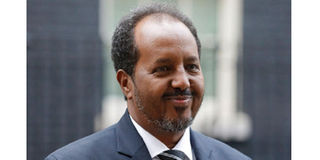How Mohamud’s election may boost Kenya-Somalia ties

Somalia President Hassan Sheikh Mohamud.
Hassan Sheikh Mohamud was elected president of Somalia, becoming the first Somali politician to be elected twice to that position, as he led the Horn of Africa nation from 2012-2017.
Relations between Kenya and Somalia had been largely good during Mohamud’s first stint as president, though he was the one who took the maritime dispute between the two countries to the International Court of Justice after much procrastination on the Kenyan side in talks to resolve the issue.
In a recent interview with a Somali online media outlet, Mohamud insisted that Kenya and Somalia are joined at the hip and are inseparable. He also rebuked ultranationalist voices in Somalia who lay claim to parts of northeastern Kenya.
Mohamud election’s, therefore, represents a great opportunity for the two neighbouring countries to reinvigorate their relations, which have been deteriorating in the last few years of outgoing President Mohamed Abdullahi Farmaajo’s reign.
But Kenya and Somalia need to change their attitudes and perceptions towards each other for their relations to improve.
For Kenya, Somalia could represent the biggest business partner among its neighbours, with statistics showing that income from miraa (khat) and other exports could reach KSh60 million a day.
The diplomatic rift between the two countries and subsequent restriction on exports of Kenyan miraa to Mogadishu have reduced income from those exports by more than half.
Also significant is that thousands of Kenyans work in Somalia, mainly as hoteliers and teachers.
Kenya, therefore, needs to stop viewing Somalia only through the lenses of national security and instead start seeing it as a strategic business partner that it should keep.
The Kenyan government also needs to stop treating Mogadishu as the younger and incapable brother it once was during the years of the transitional government. That period elapsed in 2012, and since then Somalia has had a fully fledged and internationally recognised federal government.
Similarly, thousands of Somalis moved to Kenya during the prolonged civil war and some of them are running thriving businesses estimated to be worth billions of shillings. There are also hundreds of thousands of Somali refugees who have lived in Kenya since 1991.
Somalia should also reboot its national priorities and view Kenya as a lucrative business hub for its nationals and a strategic partner that stood by it during the difficult times.
This is the only way the two countries can enjoy a good and lasting partnership regardless of who is in charge in Mogadishu at any given time.
Abdi Sheikh is a PhD candidate, political strategist, communication expert and former head of the BBC’s Somali Service.





